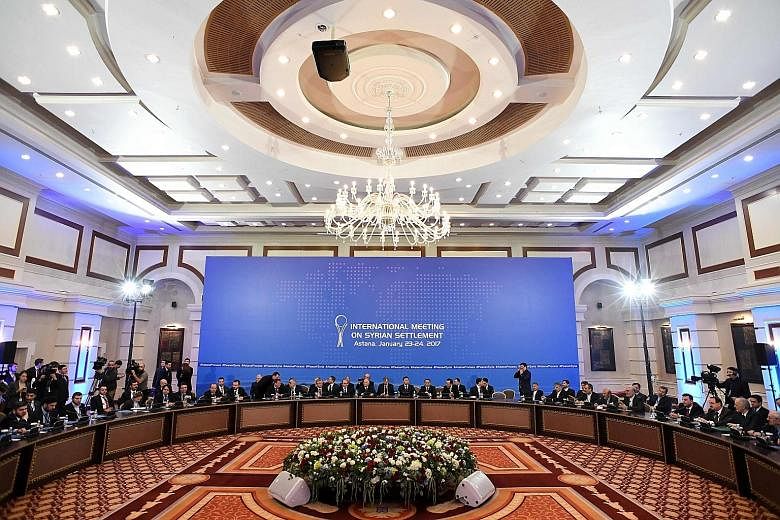ASTANA • Russian-led talks on Syria ended with agreement yesterday to bolster a ceasefire even as apparent disputes with Iran, a staunch supporter of Syrian President Bashar al-Assad, threaten to hold up efforts to end the six-year civil war.
Russia, Turkey and Iran will set up "a trilateral mechanism to observe and ensure full compliance with the ceasefire, prevent any provocations and determine all modalities" of the truce established last month, the countries said in a joint statement at the end of two days of negotiations in the Kazakh capital, Astana.
While the Astana meeting provided an effective platform for talks between the Syrian government and opposition groups, there iss an "urgent necessity to step up efforts to jump-start the negotiation process", they said in the statement.
They added that representatives of the Syrian armed opposition should take part in United Nations-led talks that are due to resume in Geneva on Feb 8.
Amid declining relations with the Obama administration over a failed peace effort last September, Russia seized the diplomatic initiative after its forces helped Mr Assad to expel rebel fighters from Aleppo, once Syria's largest city, last month - a turning point in a war that has killed more than 300,000.
Still, the ceasefire in Syria brokered by Russia and Turkey is not holding everywhere, with fighting continuing near the capital Damascus especially.
The effort by Russia, Turkey and Iran, the three countries with forces on the ground in Syria, suffered a setback on Monday when opposition groups rejected face-to-face meetings with government representatives at the talks. They negotiated instead in separate rooms, through mediators.
Iran could play the role of a spoiler in the Russian efforts to get the ceasefire on track, said a Western diplomat monitoring the Astana meeting, who spoke on condition of anonymity because of the need to observe diplomatic protocol.
The Astana meeting "is a very important and symbolic step that will allow us to reach a new stage in the negotiations", Mr Alexander Lavrentiev, the Kremlin envoy to Syria who heads Russia's delegation at the talks, told reporters earlier.
Tensions are increasing between Russia and Iran, which have fundamentally different ambitions in Syria, said Mr Alexei Malashenko, a Middle East analyst at the Carnegie Moscow Centre. Teheran is determined to push home Mr Assad's advantage while Moscow wants to scale down its military involvement, he said.
The fact that government forces continue to break the truce means "it hasn't been implemented", Mr Osama Abu Zaid, a member of the opposition delegation, told reporters yesterday. He added that they are "expecting more than warnings" from Russia to Mr Assad and "want action" .
BLOOMBERG

